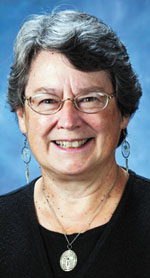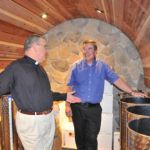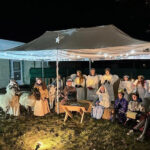By Corinne Winter
May 31 is Pentecost Sunday. During Mass, we hear the account from the Acts of the Apostles of the Holy Spirit’s coming to the Apostles, filling them with courage and enthusiasm for continuing the work of Christ. As I read this story, I find myself feeling a bit restless. If only the guidance of the Spirit would be as clear and dramatic as it is portrayed here. Why doesn’t God send wisdom and power “like a strong wind,” and like fire to show us what we need to do right now and to move us to action? Why are we still waiting, wondering and longing?

Perhaps because we often neglect the richness of the theology of the Holy Spirit, we may think that only an extraordinary and highly visible manifestation indicates the Spirit’s presence and work among us. But Catholic teaching on the Spirit’s work urges us to a broader understanding.
The Holy Spirit is the force behind all growth in faith and every witness to the faith. Of course, when we think of giving testimony to the faith, our minds are drawn first to those whose words and/or actions have been notable enough to draw attention from many in the church: the canonized saints, extraordinarily dynamic preachers and those in our time working to change lives for the better. But the very fact that we recognize and are attracted to their messages and actions is the work of the Holy Spirit in our own lives.
The Catechism of the Catholic Church lists eight ways in which the Spirit is at work in the life of every person of faith: in the Scripture, in the church’s Tradition, in the work of the Magisterium, in the sacramental liturgies, in prayer, in the gifts and work of every person who contributes to the life of the church, in those who spread the Word by preaching, teaching and lived witness to the faith (CCC no. 688). At this time, our participation in the sacraments is limited due to the coronavirus. But, through the power of the Holy Spirit, the church is present when the Eucharist is celebrated. As members of Christ’s body, we remain connected to God’s self-gift. We are spiritually present in the prayers of the priest and of the few others who can participate as well as through our own prayers of longing.
And each of the other signs of the Holy Spirit’s presence is abundantly available. As we watch the Mass on television or online, we may be drawn to pay more attention to the readings and to the homily as sources of nourishment in faith. We may grow in our appreciation for the work of those who help to bring us the Mass and other forms of prayer and reflection online.
Intense time with immediate family and the forced separation from others may lead us to reflect on the importance of those relationships and on ways to show others our own love as a sign of God’s love. We may recognize that the ability to be patient with one another as well as with things we feel are not happening quickly enough around us is God’s gift. Patience is one of the “fruits of the Spirit (see CCC no. 736; Gal 5: 22-23).”
Moreover, the Spirit is at work throughout the world, drawing all toward God. Society at large is encouraging us to recognize the heroism of health care workers and of others who are working under extraordinarily difficult and even dangerous conditions to provide for the needs of others. Faith leads us to see all works of generous self-giving as signs of the Spirit’s presence.
The experience of this pandemic has brought out in many people a desire to help others who are suffering. Almost daily, the news includes accounts of people reaching out to others. People hold drive-by celebrations for nursing home residents. Restaurant owners who are themselves experiencing a downturn in business nonetheless provide meals for those who are food insecure.
As Barb Arland-Fye pointed out in an editorial a couple of weeks ago, the news also highlights changes that are needed in our economic structures. The rapid spread of the virus in some workplaces and in long-term care facilities shows that the existence of poor working conditions, unrealistic expectations of workers, low pay, and lack of health care does serious harm within our society. If we are disturbed by those insights, the Holy Spirit may be at work within us urging us to do whatever we can to address the injustices.
While we can’t be together to raise our voices worshipping the Holy Spirit together with the Father and the Son, may we see the ways in which the Holy Spirit is at work, and so be encouraged in our faith. Father, through your Son, send your Spirit to enlighten our minds and enliven our hearts that we may know and do your will in the world as it is now.
(Corinne Winter is a professor-emerita of St. Ambrose University, Davenport.)











